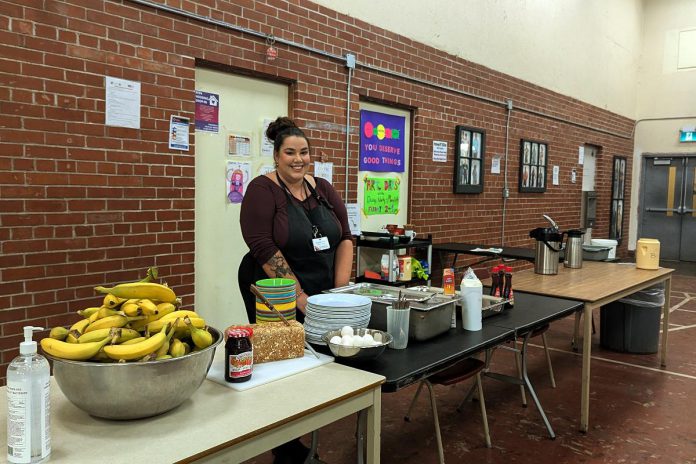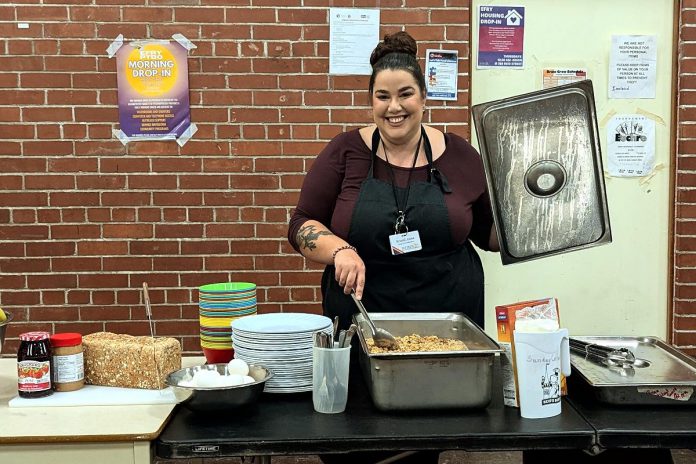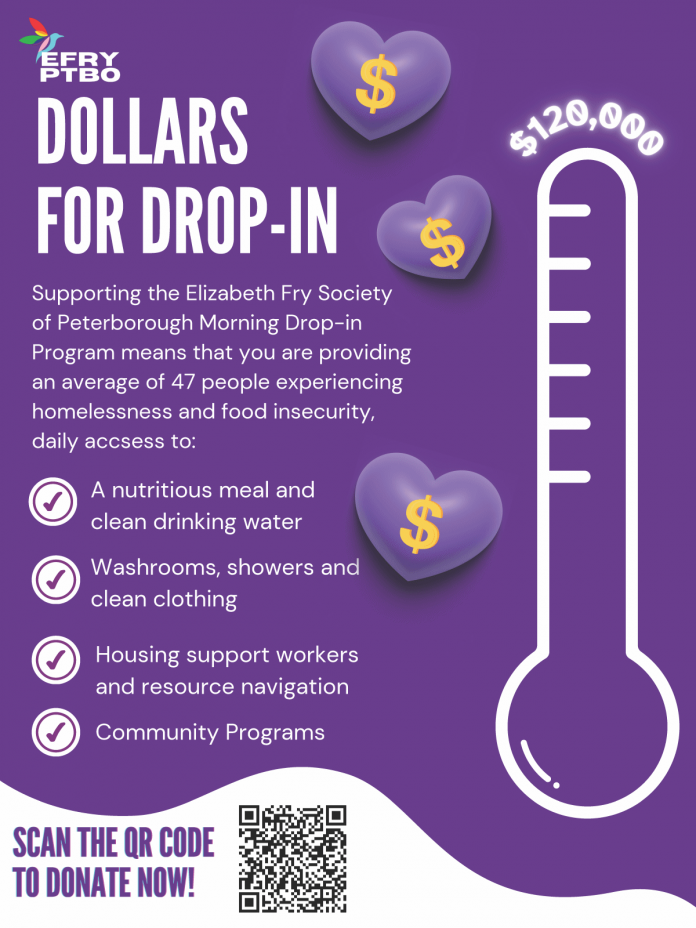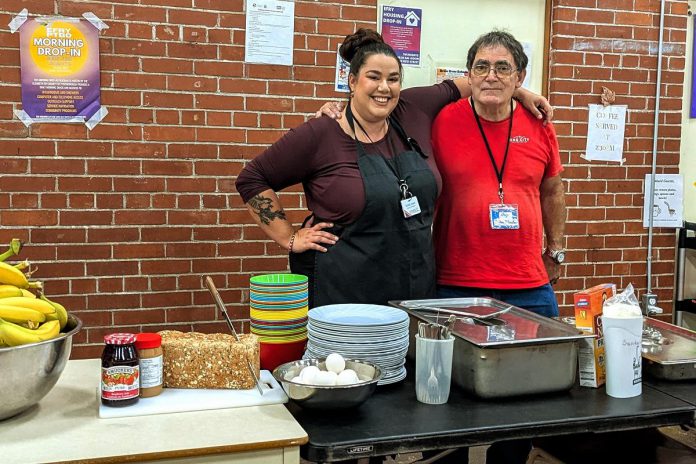
Few know the value of the morning drop-in program at Peterborough’s Trinity Centre like Kristal Jones-Craighead, and that’s why she is hopeful that a newly launched fundraiser will mean the program can keep running for another year.
As the program’s coordinator, the Elizabeth Fry Society of Peterborough worker regularly sees, hears, and feels the many benefits of the program that’s offered on weekdays from 10:30 am to 1 p.m. at the Reid Street centre, which is operated by One City Peterborough for people who are unsheltered or marginalized.
Since January 2023, the morning drop-in program has done much to lessen the impact of the gap between One City’s overnight program and its afternoon program by providing a welcoming place for people from all walks of life — not just those living on the streets — to share a light breakfast and coffee, access a community clothing cupboard, harm reduction supplies, and washrooms and showers, and connect with housing outreach workers.
But the program’s real value, says Jones-Craighead, lies in the little things most of us take for granted; little things that mean the world to anyone who is struggling for whatever reason.
“The most important thing I do isn’t serving breakfast or opening the washrooms,” she explains. “It’s saying ‘Good morning. I’m so happy you’re here today. How are you?’ It’s letting folks know I’m happy to see them.”
“Healing and recovery doesn’t happen in isolation. It doesn’t occur in a vacuum. Folks need community. They need a place where they belong, where they’re not rushed along to the next spot, where they’re allowed to just be.”

According to Jones-Craighead, that kind of social support is critical for people who already face barriers to belonging.
“That rapport building, coming in and seeing workers that are supporting community, and being in community with each other, builds trust. Community members are then able to ask for more significant long-term support that will help them change their circumstances.”
In a 2023-24 progress report on the program she authored, Jones-Craighead noted the morning drop-in program had, at the time, been offered 428 days and served an average of 47 guests daily. A total of 19,688 meals had been served and housing outreach assistance had been accessed some 260 times.
Impressive, for sure, but it all comes with a cost — about $10,000 per month, according to Jones-Craighead.
On Monday (October 14), a new partnership between the Elizabeth Fry Society and Peterborough Action for Tiny Homes (PATH) was announced, the result being a $10,000 donation to the program. While that’s enough to keep the program going for another month, until the end of November, more funds are needed to keep the program running beyond that.
As such, the Elizabeth Fry Society of Peterborough has also launched the “Dollars for Drop-In” fundraiser, with a target goal of raising $120,000 to fund the program for another 12 months beyond November. Donations are now being accepted online bit.ly/dollarsfordropin.
As optimistic as Jones-Craighead is that the goal will be reached — “I’m confident in the generosity of this community; I see it every day.” — she admits it can be a tough sell in the face of a disconcerting reality that sees many question any funding of such programs, regardless of the source of that funding.
“I believe that most people are genuinely good-hearted people who don’t want to see folks in these circumstances,” she says. “They’re frustrated because it doesn’t seem that there are any easy answers.”
“But without being too harsh, I can’t help a corpse recover. I can’t put somebody who’s not alive through a treatment program. We’re in a crisis and the service we’re providing is a response to it.”
“I tend to ask people ‘What would you do? What would you like to have done if it’s a family member who’s struggling? If it’s a neighbour who’s struggling? If it’s someone who taught you in school or fought in a war for your freedom, or a nurse who has helped you at the hospital?’ Those are the people struggling who are coming through our doors.”

PATH’s $10,000 donation doesn’t mark that organization’s first assistance to the morning drop-in program. It continues to provide clothing to those who access the program via its Clothing and Essential Item Hub location at 385 Lansdowne Street East.
In addition, the morning drop-in program was boosted in a big way in 2023 by the United Way of Peterborough and District that provided $75,000 in funding from its Innovation Fund. Other partners have included the Peterborough AIDS Resource Network (PARN) and the Peterborough Family Health Team.
While grateful for any and all support that has come the program’s way, Jones-Craighead points out the program’s hand-to-mouth existence is as frustrating as it is worrisome. To counter that, she keeps positives well in mind to buoy her spirits.
“Wayne, our coffee master, volunteers every single morning, five days a week,” Jones-Craighead says. “He makes coffee, he sets up tables and he does dishes. He’s experiencing homelessness and the impacts of the housing crisis, and yet he comes every day. It was his birthday recently and I said ‘Wayne, take the day off’ and he said ‘This is where I want to be.’ That’s the stuff that keeps me pushing through.”
“I also look at what has been accomplished — amazing work is being done in this community. I have the radical audacity to believe that the goodness of folks is going come through and we’re going to get this done. It’s not like I go home at the end of my day and think ‘Well, I’ve just done all the work there is to do and I can put my feet up and feel good about it.’ I try to refocus my scope to ‘I’ve done enough for today, and tomorrow we’ll try again.'”
“Ideally, I’d like to be out of a job because there is no need to respond to. I am worried the need is going to continue beyond my capacity, or beyond the capacity of the building of community partnerships. We’re just crisis response here, trying to create a hub that supports as many folks as we can, but there are a lot of folks we’re not reaching.”

When all is said and done, the Dollars for Drop-In appeal, says Jones-Craighead, must hit its goal for the morning drop-in program to continue for at least a year.
“We’ve got to have folks there to operate the program, and we need a bit of a budget for food,” she says, adding “We run on a shoestring. It is pretty impressive what we’re able to do. We’re helping as many as 47 to 50 people per day. In the winter, we’ll see that go up to 60 to 70 per day.”
“If we don’t have the funds, those services will have to stop. We’ll then work to provide the community and our partners with as much notice as possible, because the impact will be surely felt throughout the entire city.”
As for what that impact may be, Jones-Craighead is blunt in her assessment.
“Unfortunately, it will come at the cost of folks’ well-being,” she says. “Heaven forbid it doesn’t result in loss of life, but we know when there are hours in between (available programs) and people are left in the cold, things don’t always go well.”
This story has been updated to correct Kristal Jones-Craighead’s title from “social worker”. She is a graduate of the Social Service Worker program at Fleming College.


























